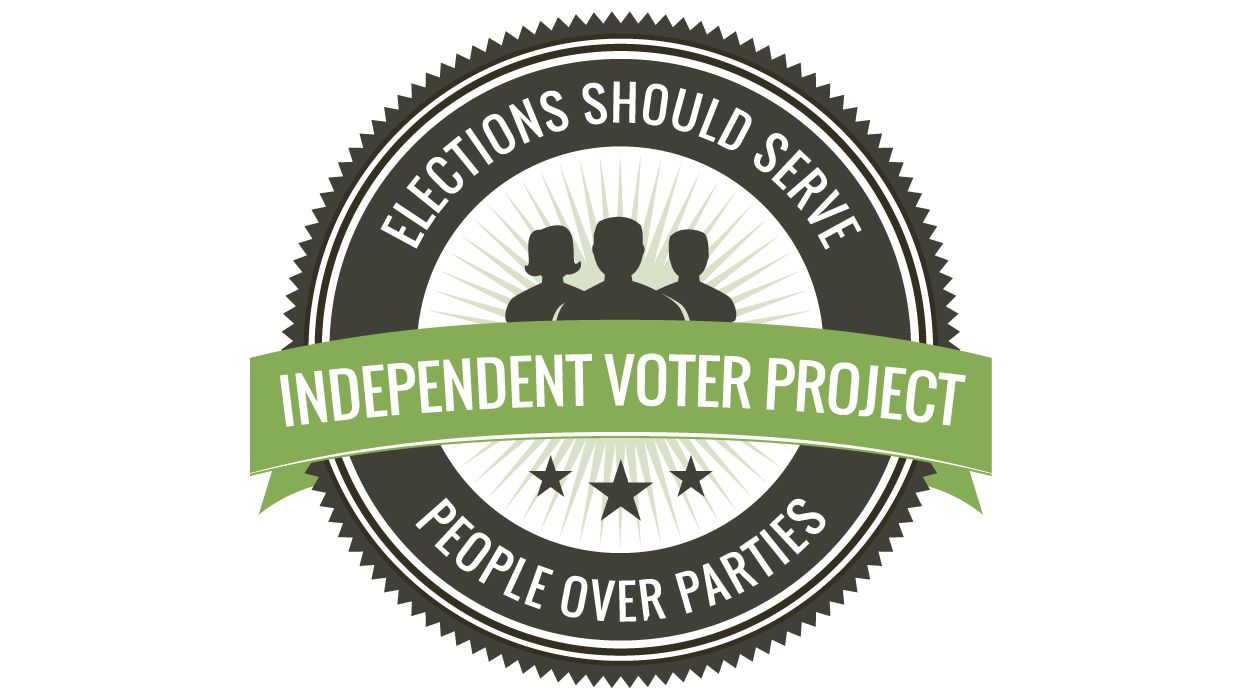Guide to California’s Propositions for Independent-Minded Voters

When Californian voters head to the polls on November 8 for the General Election, they will be faced with 17 statewide propositions. We have summarized each proposition with arguments for and against to help you cast an informed vote.
Propositions have been arranged so that the more contentious ones are at the top.
Proposition 64. Marijuana Legalization. Initiative Statute.
Proposition 64 would legalize marijuana and hemp under California state law, provide for regulation and taxation on sale, and allow adults to produce and consume marijuana. Like alcohol and cigarettes (since June 2016), marijuana would be legal for adults 21 and older.
Prop 64 imposes a 15% retail sales tax on pot. It would enact state cultivation taxes, $9.25 per ounce of flowers and $2.75 per ounce of leaves. Medical marijuana would be exempt from some taxation. Local regulation and taxation is also allowed.
The revenue from these taxes supports youth programs, environmental protection, and law enforcement.
Furthermore, Prop 64 establishes standards for packaging, labeling, advertising, and marketing for marijuana products. The initiative allows for the creation of a new regulatory agency for the drug with tracking, regulating, licensing and enforcement powers.
While California legalized medical marijuana in 1996 with Proposition 215 and Senate Bill 420, the new prop legalizes recreational marijuana. Currently, possession of up to one ounce of recreational pot is an infraction, with a $100 fine.
Proposition 64 would re-sentence and destroy records for prior marijuana convictions. Between 13,000 and 15,000 people have been arrested for felony marijuana charges each year since 2008, according to the California 2013 crime report.
A “yes” vote would legalize recreational marijuana possession, use, sale, production, as well as the creation of a 15% tax and accompanying regulatory bureau, and a “no” vote would maintain recreational marijuana’s illegal status in California.
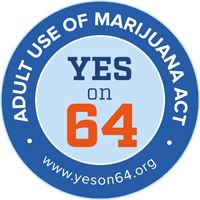
Supporters argue Prop 64 is one step closer to creating responsible, structured, regulated drug policy for California. Current policy disproportionately affects minorities and low-income citizens. Prop 64 will regulate marijuana and ensure its safe manufacture and use, treating it as we do alcohol or any other legalized controlled substance.
Endorsements include U.S. Senator Bernie Sanders (I-Vt.), California Lieutenant Governor Gavin Newsom, California Democratic Party, California State NAACP, California Medical Association, former Facebook president Sean Parker, and a variety of drug policy-related organizations, including New Approach PAC.
The Californians to Control, Regulate, and Tax Adult Use of Marijuana While Protecting Children PAC has raised over $6 million in support from Sean Parker and drug-policy related PACs and organizations, as well as large portions of citizen donations.
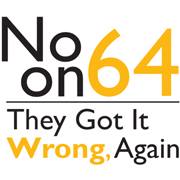
Two arguments present themselves in opposition to Prop 64. The first states marijuana is a gateway drug and should be strongly regulated, or remain illegal. We need to keep public health in mind and ensure that the health needs of Californians are met. The second states Prop 64 opens the door for large-scale marijuana corporations, and doesn’t protect small growers. Regulation must be stronger to protect small marijuana-based business owners.
Endorsements include Representative Jim Cooper, Senator Cathleen Galgiani, California Hospital Association, Small Growers Association, California Teamsters Union, and California Correctional Supervisor’s Association.
The Coalition for Responsible Drug Policies has raised $135,000, and is sponsored by the California Public Safety Institute.
Proposition 56. Cigarette Tax to Fund Healthcare, Tobacco Use Prevention, Research, and Law Enforcement. Initiative Constitutional Amendment and Statute.
Proposition 56 would increase the tax on cigarettes by $2.00 per pack, and would apply similar increases on e-cigarettes containing nicotine and other tobacco products.
Currently, California taxes tobacco $0.87 per pack of 20 cigarettes, which was established in 1998. Thus, Prop 56 would nearly triple the current tax.
The prop will generate an additional $1 to $1.4 billion in net state revenue between 2017-2018, and potentially lower revenue in later years. The annual funds will go to state agencies focused on healthcare, including:
- $40 million to University of California physician training,
- $30 million to the California Department of Public Health’s dental program,
- $30 million to the attorney general’s office for local police agencies.
Most of the remaining funds would augment Medi-Cal, as well as fund prevention/control programs for tobacco use, and tobacco-related research and law enforcement.
A “yes” vote would increase the tobacco tax to $2.87 per cigarette pack and an equivalent amount on related tobacco products, and apply the tax funds to health and tobacco prevention/control programs, while a “no” vote would make no changes on state taxes for cigarettes and related products.
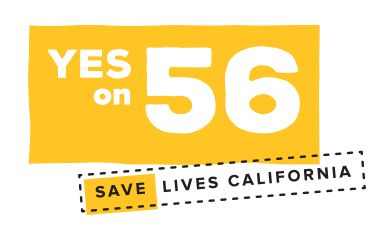
Supporters say 'Tobacco kills.' They want to make it more difficult for people to support a smoking habit. The extra money can be put to good use in healthcare and education.
Supporting endorsements include Yes on 56: Save Lives California is leading the campaign for supporting Prop 56. Endorsing its actions are dozens of members of Congress, state and national senators, Assembly members; the California Democratic Party; several local Chambers of Commerce; the California Labor Federation; California NAACP, and several medical associations
There are no official financial endorsements.
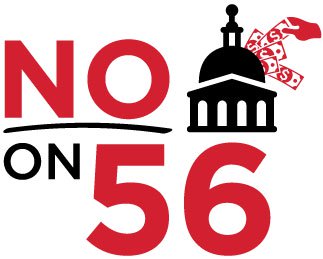
Opponents argue that there are already a plethora of tobacco taxes. Why should it matter what people do with their own money? Another tax is unnecessary and an infringement on personal freedom.
No on 56 - Stop the Special Interest Tax Grab. Major Funding by Philip Morris USA Inc. and R.J. Reynolds Tobacco Company, with a Coalition of Taxpayers, Educators, Healthcare Professionals, Law has raised $35,5 million.
Total amount of reported contributions to this measure is $16,8 million.There are no official PACs on either side of Prop 56.
Proposition 61. State Prescription Drug Purchases. Pricing Standards. Initiative Statute.
Proposition 61 would regulate the prices state agencies pay for drugs. The lowest price paid by the U.S. Department Veterans Affairs (USDVA) would set the price for prescription drugs paid by state agencies. The USDVA currently pays 41% of market price, compared to Medi-Cal’s 51%. This would drive the prices down for state healthcare agencies.
The prop would prohibit state agencies from purchasing any prescription drug at a price higher than the lowest cost the USDVA pays for the same drug. The program exempts managed care programs funded through Medi-Cal.
It has the potential to save the state money depending on implementation and the response of drug manufacturers to the provision and drug pricing.
Currently, state agencies negotiate the prices of prescription drugs without reference to the prices paid by the U.S. Department Veterans Affairs (USDVA).
A “yes” vote would regulate drug prices by requiring state agencies to pay the same price as the lowest price paid by the USDVA for prescription drugs, and a “no” vote would not apply the price regulation to state agencies.
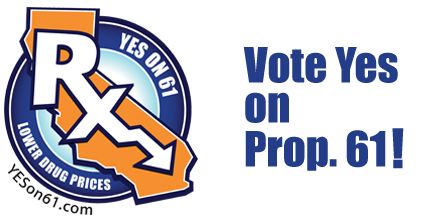
Supporters argue Prop 61 will give the government the upper hand in negotiating fair drug prices, driving them down for low-income consumers. This will allow low-income patients to get the life-saving drugs they need. Why let poor patients die while pharmaceutical companies make billions?
Endorsements include many local Democratic Party affiliates, California AARP, and California Nurses Association, AIDS Healthcare Foundation; US Senator Bernie Sanders, Rev. Al Sharpton, US Representative Mike Honda, and state Assemblymembers David Chiu and Kansen Chu.
The Californians for Lower Drug Prices PAC has raised nearly $10 million in contributions, largely from the AIDS Healthcare Foundation.
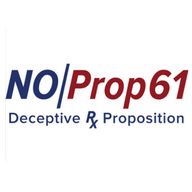
Opponents argue the USDVA is hardly the system we ought to be emulating: long wait times, bad treatment, and costly to the taxpayer. Bringing those costs to bear on patients and taxpayers is unfair to Californians. What’s more, the money lost to pharmaceutical companies would go towards more life-savings drugs. In the long term, it would stifle innovation and life-saving breakthroughs that drug companies develop with their profits. And since when is the state good at determining prices?
Endorsements include several pharmaceutical companies, including Johnson & Johnson, Purdue Pharma, and Amgen; Project Inform; California Medical Association and other medical organizations.
The Californians Against the Misleading RX Measure PAC, sponsored by Pharmaceutical Research and Manufacturers of America, has raised $69 million to campaign against the proposition, largely from pharmaceutical companies, including those measured above.
Proposition 52. Medi-Cal Hospital Fee Program. Initiative Constitutional Amendment and Statute.
Proposition 52 would indefinitely extend the existing statute where California private hospitals pay a fee to help fund Medi-Cal health services, care for uninsured patients, and children’s health coverage. The fiscal impact to the state can be very little or range to around $1 billion in savings, with increased annual funding for public hospitals in the low millions.
In order to receive federal medical funds (Medicaid), California must contribute a matching sum. California's Medicaid program is called Medi-Cal; the funds of which provide healthcare to low-income Californians, seniors, children and adults with disabilities.
In 2009 a program was created requiring California private hospitals pay a fee, rather than taxpayers, to assist raising the funds. The program raised over $2 billion for the state, and thus another $2 billion in federal funds. The fees were then paid to hospitals for uncompensated patient services. It is set to expire in 2018.
Prop 52 would continue and make permanent the 2009 program. If passed, the prop would also make it more difficult for the legislature to make changes to the fee system.
A "yes" vote would indefinitely extend the existing charge on private hospitals and subsequent Medi-Cal revenue, and a "no" vote would let the charge on private hospitals to expire in 2018.

Supporters argue the state currently has the discretion to place the funds wherever it wishes. Under Prop 52, the voters could keep the government accountable and ensure that the funds end up where they should- primarily, in the hospitals.
Supporting endorsements include California Hospital Association, Solano County Supervisors, and the California Democratic Party.
Californians United for Medi-Cal Funding and Accountability has raised nearly $60 million, largely from the California Health Foundation and Trust, Los Angeles Children’s Hospital, and other medical centers.

Opponents argue Prop 52 will put billions at the disposal of top hospital executives with no accountability to increase quality or accessibility of care. It’s reckless and unwise to pass this legislation.
Opponent endorsements include Service Employees International Union, and United Healthcare Workers West.
Californians for Hospital Accountability and Quality Care has raised $11.5 million, supported heavily by the Service Employees International Union affiliate United Healthcare Workers West.
Proposition 63. Firearms. Ammunition Sales. Initiative Statute.
Proposition 63 would prohibit the possession of large-capacity ammunition magazines, as well as require a background check and subsequent authorization from the California Department of Justice in order to purchase ammunition.
The large-capacity magazines typically hold 30 rounds or bullets. The prop would make it illegal to buy or own them.
Furthermore, vendors would need to be licensed to sell most ammunition and maintain records of ammunition sales. Gun stores would need to report lost or stolen ammunition and guns, and the crime would be a felony.
There would be an annual increase in state, as well as local, court and law enforcement costs, possibly in the tens of millions of dollars. The court costs include new court process where persons convicted are no longer allowed to possess firearms.
Between individuals, bullet sharing would be illegal if one of the individuals was not allowed to purchase bullets for themselves.
After the San Bernardino and Orlando nightclub shootings, the California legislature passed tougher gun laws. The laws prohibit the possession of high-capacity magazines for assault weapons and semiautomatic weapons with “bullet buttons” for magazine quick-release, as well as crack down on false stolen firearm reports.
These laws, signed by Jerry Brown at the end of June, are similar to Prop 63, but the prop had already qualified for the ballot by that time.
A “yes” vote would prohibit the sale of large-capacity ammo magazines, make it a felony to steal guns or ammo, require vendors to obtain and license and keep records, require buyers to pass a background check and receive California Dept. Justice authorization to buy ammo, and create a court process for removing firearms from convicted persons, while a “no” vote would not apply the above processes to gun buyers and vendors.

Supporters argue that Prop 63 prohibits felons, violent criminals, and others who should not possess firearms from possessing firearms. Goal here is safety from public shootings by people who should not have had access to such weapons in the first place. Citizens should not have such heavy machinery anyway - there’s no need.
Supporting endorsements include several California gun prevention organizations; California Democratic Party, California League of Women Voters, California Federation of Teachers; and Lieutenant Governor Gavin Newsom.
The Safety For All, Yes on Prop. 63, Newsom Ballot Measure Committee raised $4 million.

Opponents argue that increased costs related to regulating ammunition sales, court and law enforcement, and state and local correctional costs. People have a right to bear arms - this is being taken away by this law. Easy access is being denied, these regulations will be time consuming.
Opposing endorsements include Coalition for More Civil Liberties, National Rifle Association, Gun Owners of California, Women Against Gun Control, and others.
The Coalition for Civil Liberties, a Project of California Rifle & Pistol Association and Stop Prop 63, a Grassroots, Common-Sense Effort for Rational Policy Sponsored by Firearms Policy Coalition have raised $425,987.
Proposition 62. Death Penalty. Initiative Statute.
Proposition 62 would repeal the death penalty in the state of California. The maximum punishment for murder would become life in prison without parole. Additionally, it would apply retroactively to those currently on death row.
The prop would also increase the portion of life-without-parole inmates’ wages that may be applied to victim restitution. All convicted murderers sentenced to life imprisonment without parole would pay 60% of their wages to compensate victims, currently inmates pay 50% of their wages.
There would be an ongoing reduction of $150 million annually in state and county justice costs within a few years, although the impact could vary by tens of millions depending on various factors.
Since California’s current capital punishment law took effect in 1978, there have been 15 inmates executed.
A “yes” vote would mean no offenders could be sentenced to death by the state, the maximum punishment would be life without possibility of parole, and an increased portion of offender’s wages to victim restitution, while a “no” vote would maintain the death penalty in California.
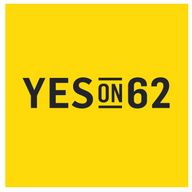
Supporters argue that there are problems with our current death penalty system that has resulted in no one being executed in the past 10 years, even though Californians are still paying. Estimated annual $150 million in reduction costs to state and local gov’t within a few years of eliminating the death penalty.
Endorsements include California Democratic Party, Justice that Works, and Taxpayers for Sentencing Reform.
Financial endorsements include Yes on 62: Replace the Costly, Failed Death Penalty System; sponsored by Taxpayers for Sentencing Reform has raised $4,3 million.
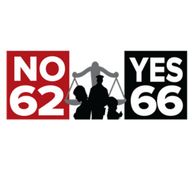
The opposition states voters support reform of California’s death penalty. It has become ineffective because of waste, delays, and inefficiencies.
There are no official endorsements.
Californians to Mend, Not End, the Death Penalty. No on Prop 62, Yes on Prop 66. Supported by Prosecutors, Law Enforcement, and Families of Victims have raised $3,6 million.
Proposition 66. Death Penalty. Procedures. Initiative Statute.
Proposition 66 would alter procedures governing state court appeals and petitions challenging death penalty convictions and sentences. The initiative aims to reform the appeal system and other procedures around death row inmates’ lives.
It authorizes transfers among California prisons for death row inmate transfers, and increases the portion of condemned inmates’ wages that can be applied to victim restitution. Currently inmates pay 50% of their wages to their victims. Restitution will be deducted from working inmates pay, either 70% of wages or the balance owing, whichever is less.
Prop 66 also allows inmates to transfer to any state prison, and provides the procedures to do so. It designates the superior court for initial petitions and limits successive petitions. It establishes a 5-year time frame for appeals.
The initial petition must be filed within one year of the death sentence, and each petition shall be resolved within one year, to take no longer than two years. It requires appointed attorneys who take noncapital appeals to also accept capital, or death penalty, appeals.
Prop 66 exempts prison officials from existing regulation processes for developing execution methods. This means that execution by lethal injection can be done by other means than intravenous injection should the warden determine the method is impractical due to on the condition of the inmate.
The fiscal impact is largely unknown, but could potentially provide tens of millions of dollars for annual savings.
A “yes” vote would alter the death penalty conviction and sentence system for court appeals by increasing available attorneys, limiting the appeal time frame, increasing victim restitution, and allowing condemned inmates to be housed at any state prison, while a “no” vote would oppose the changes and maintain the current system.

Supporters argue justice must be done to perpetrators of major crimes. They ought to pay for their crimes by working and, in extreme cases, paying the ultimate price. We must preserve the death penalty to ensure a justice continues to be served.
Endorsements include Former NFL player Kermit Alexander and San Bernadino County District Attorney Mike Ramos.
Support: Californians to Mend, Not End, the Death Penalty. No on Prop 62, Yes on Prop 66. Supported by Prosecutors, Law Enforcement, and Families of Victims raised $3.7 million.
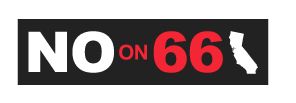
Opponents argue the death penalty is inhumane and obsolete. Prop 66 will seek to reinforce it and keep it alive longer than it should. Inmates are people too; they have rights. We should work towards rehabilitation, not death. Ever heard of the Ludovico treatment?
Endorsements include the California Democratic Party.
Proteus Action League Non-Profit 501 (C)(4) Organization, Opposing Measure 66. CY and No on Prop 66 Sponsored by PowerPAC.org and American Civil Liberties Union of Northern California, with help from Organizations for Fair Justice raised $375,711.
There are no official PACs on either side of Prop 66.
Proposition 57. Criminal Sentences. Parole. Juvenile Criminal Proceedings and Sentencing. Initiative Constitutional Amendment and Statute.
Proposition 57 affects two portions of the justice system, both in an attempt to reduce the prison population.
It would increase the chances of parole for those convicted of a nonviolent felony offense (list of violent offenses here), as well as give inmates more opportunities to earn good behavior credits and approved rehabilitative or educational achievements.
Secondly, Prop 57 would allow judges to decide whether to try juveniles as adults. The criteria for evaluation remains the same. Under current law, prosecutors make the decision whether or not to try those under age 18 as minors or not. The prop would mandate a hearing in juvenile court before transferring to adult court.
Currently, parole is given on three bases: medical, elderly, and life sentences that fall under the Indeterminate Sentencing Law (includes sentences such as “15 years to life”). This proposition would allow nonviolent felons the opportunity for parole in addition to these.
The prop would probably cost a few million dollars annually.
A “yes” vote would mean nonviolent felons are able to earn more good behavior credits and potentially early parole opportunities, in addition to giving judges the power to decide if juveniles are tried as adults, while a “no” vote would maintain the current parole system and prosecutors’ ability to prosecute under age minors as adults for certain crimes.

Supporters argue that youth don’t fully develop until age 25; therefore, they should be tried as juveniles. Our prison system cannot afford to hold everyone forever, and we need to decrease our inmate population. Prop 57 will help do that by incentivizing and rewarding prisoners that show improvement.
Endorsements include Gov. Jerry Brown (D), Newt Gingrich, Sen. Loni Hancock, Head of Californians for Safety and Justice Lenore Anderson, Charlie Beck - L.A. Police Chief, and Santa Clara County public defender Molly O’Neal.
The Civic Participation Action Fund - Yes on 57 (NonProfit 501(C)(4)) raised $88,760 and the Yes on Prop. 57, Californians for Public Safety and Rehabilitation raised $6.9 million.

Opponents argue Prop 57 takes power away from attorneys. Under Prop 57, if a person is convicted of burglary but has prior convictions for rape and murder, they are eligible for parole as soon as they finish their sentence. This is too lax on criminals and could make our streets less safe.
Endorsements include Sen. Andy Vidak, Yuba County district attorney Pat McGrath, and California Republican Party.
No on 57: Stop Early Release of Violent Criminals (SERVC) raised $90,000.
There are no official PACs on either side of Prop 57. However, the California Republican Party has voiced support for citizens working against Prop 57.
Proposition 65. Carryout Bags. Charges. Initiative Statute.
Proposition 65 would redirect money collected from the sale of carry-out bags by grocery and retail stores to a special fund administered by the Wildlife Conservation board.
The prop gives power to the Wildlife Conservation board to develop regulations for implementing the law. The money collected would be earmarked for the Environmental Protection and Enhancement Fund.
After repaying a startup loan for the establishment of regulating and implementing the law from Safe Drinking Water, Water Quality and Supply, Flood Control, and Coastal Protection Fund of 2006, the monies will be given to projects such as:
- drought-stressed forest remediation,
- expansion and restoration of wetlands, fish habitat, or waterfowl habitat,
- recycling,
- clean drinking water supplies,
- state, regional and local parks,
- beach cleanup,
- litter removal,
- and wildlife habitat restoration.
No more than 2% of the funds would be used for administrative fees.
A “yes” vote would redirect money collected from carry-out bag sales to the Environmental Protection and Enhancement Fund administered by the Wildlife Conservation Board, and a “no” vote would not redirect funds from carry-out bag sales by grocery or other retail stores.

Supporters say grocers currently sell paper or reusable carryout bags for a minimum of 10 cents. This provides the grocers and retailers with millions in revenue every year, but there is little or no benefit to the environment. The people of California have a right to have their money protect the environment rather than enrich corporations.
Endorsements include Doyle L. Johnson and Kurt Oneto.
The American Progressive Bag Alliance, a Project of the Society of the Plastics Industry (Non-Profit 501 (c) (6)), Yes on 65 and No on 67 raised $6 million.

Opponents say this is a disingenuous ballot measure - major environmental groups actively oppose this. [Does not state which groups] Wildlife Conservation Board alone decides what to spend money on. People have no say in the environmental projects that their own money is being used for.
There are no official endorsements.
There are no official financial endorsements.
Proposition 67. Ban on Single-Use Plastic Bags. Referendum.
Proposition 67 would prohibit single-use plastic bags in the state of California. Pharmacies and grocery stores could sell and charge $0.10 for recycled, compostable or reusable plastic bags. Stores would keep the revenue from reusable bag sales (unless Proposition 65 passes).
There would be $2 million given to plastic bag manufacturers in California, in order to retain jobs while transitioning to thicker, multi-use, recycled plastic bags. Fiscal impact is predicted to be minor, including increase in some state administrative costs and reduced costs due to less litter and waste management.
The law does not extend to convenience stores and liquor stores until a year after implementation. Perishable items, such as meat, bread, produce, and bulk food would still be able to use single-use plastic bags.
Since 2012 a number of cities and counties across California have already banned plastic bags. In 2014, the ban on plastic bags was signed into California law through SB 270, but opponents obtained enough signatures to delay implementation until after a 2016 referendum vote - on Proposition 67.
A “yes” vote would uphold and ratify the law passed in 2014 to ban plastic bags in California, and a “no” vote would overturn Senate Bill 270, and plastic bags would continue to be used in grocery stores and pharmacies.

Supporters argue plastic bags are bad for the environment and decrease the quality of life for citizens. No one wants to see them in the water off California’s coast or in our parks. It’s like requiring seatbelts in cars: the corporations will oppose it, but it’s ultimately good for the consumer.
Endorsements include Governor Jerry Brown, Secretary of State Alex Padilla, Senators Kevin De Leon and Ricardo Lara, Representatives Rob Bonta, Kevin McCarthy, and Marc Levine. In addition, the counties of Contra Costa, Los Angeles, Marin, San Francisco, San Mateo, Santa Barbara, and Santa Clara, as well as fourteen California towns and cities, several environmental organizations, labor unions, and eco-friendly bag businesses.
Over $1.6 million has been spent to support Prop 67, largely from PACs like California vs. Big Plastic, Save the Bag Ban, and Committee to Protect the Plastic Bag Ban. In addition, grocery chains Albertsons/Safeway and Ralph’s/ Food4Less, as well as the California Grocers Association, have contributed to support. Oppose:

Opponents argue this proposition is a product of special interests and not representative of the will of the people. Plastic bags make up a small amount of the litter that plagues California; and after all, isn’t this ban another affront to liberty and freedom?
Endorsements include City of Laguna Niguel, Familias Latinas de California, Association of California Cities- Orange County, and several plastic bag and paper companies.
The opposition has spent nearly $6 million, largely from the PAC American Progressive Bag Alliance, and funded by Hilex Poly Co, LLC, Formosa Plastics Corporation USA, and other plastic bag companies.
Big businesses and special interests stand on both sides.
Proposition 54. Legislature. Legislation and Proceedings. Initiative Constitutional Amendment and Statute.
Proposition 54 would prohibit the legislature from passing any bill until it has been in print and published on the Internet for 72 hours (or 3 days) prior to the vote. Additionally, it requires legislature to record any open legislative proceedings, either through visual or audio recording, and post online.
If changes are made to the bill, the legislature must post the changes and wait an additional 72 hours before voting. The bill aims to increase government transparency.
There would be a one-time cost of $1-2 million for startup, and ongoing costs of $1 million annually to record legislature meetings and put them on the Internet.
A "yes" vote would require bills to be posted online for 3 days before the legislature could vote and for public legislature meetings to be recorded and made available on the Internet, while a "no" vote would not make those requirements.
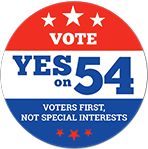
Supporters argue democracy functions best when the most people participate! Having such public access as prop 54 would allow will enhance public participation and let individual voices be heard in government legislation.
Endorsements include Hold Politicians Accountable, League of Women Voters of California, California Chamber of Commerce, and more organizations; CA State Assembly Republican Leader Kristen Olsen, and Democratic former Speaker pro Tempore of the CA State Assembly Fred Keeley.
Yes on 54 - Voters First, Not Special Interests - Sponsored by Hold Politicians Accountable has raised around $7 million.
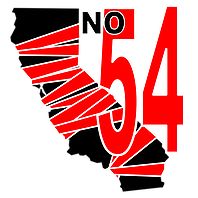
Opponents argue increased costs to state government of potentially $1-$2 million initially and about $1 million annually for making legislative proceedings available in audiovisual form on the internet.
There are no official endorsements.
There are no official financial endorsements.
Proposition 60. Adult Films. Condoms. Health Requirements. Initiative Statute.
Proposition 60 would require adult film performers to wear condoms during scenes involving intercourse. Additionally, it would require employers to provide vaccinations, testing, examinations for STDs, and to post a condom requirement notice at film sites.
Measure B in Los Angeles County, titled “County of Los Angeles Safer Sex In the Adult Film Industry Act,” already requires condoms in all intercourse scenes in adult films produced in the LA area. Passed in 2012, the measure also requires adult film production companies to obtain a health permit prior to production, as well as a notice to performers regarding condom use during production.
The measure resulted in creative filming and post-production editing in films, some exodus from LA, as well as performer complaints.
A “yes” vote would require the use of condoms and other protective measures when filming pornographic films, and require producers to pay for health check ups and requirements, while a “no” vote would not mandate condom use and health requirements for the pornographic film industry in California.
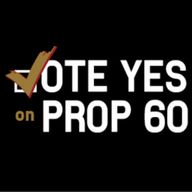
Supporters argue that at its core, Prop 60 is an employee protection measure: requiring porn film employers to provide condoms, testing, and vaccinations protects actors from multiple diseases, including AIDS. What’s more, it would de-stigmatize condoms and promote safe sex among viewers.
Endorsements include For Adult Industry Responsibility (FAIR) and the AIDS Healthcare Foundation.
FAIR and the AIDS Healthcare Foundation have raised over $2 million to campaign in support of Prop 60. All proceeds have come from the AIDS Healthcare Foundation.

Opponents argue Prop 60 will only drive adult film production underground- thereby making it less safe- or out of state. In addition, people ought to have a right to do with their bodies what they please; Prop 60 is a moralistic infringement on personal rights. Are we really going to use state funds to employ a “porn czar” bureaucrat to monitor pornographic film production?
Endorsements include Free Speech Coalition; the California Democratic Party and local affiliates has historically opposed measures like this one, but has yet to take an official position.
No on Proposition 60, Californians Against Worker Harassment, Sponsored by the Free Speech Coalition has raised $87,150. There are no registered PACs opposing Prop 60.
Proposition 55. Tax Extension to Fund Education and Healthcare. Initiative Constitutional Amendment.
Proposition 55 would extend Proposition 30, nicknamed the "millionaire's tax," to 2030.
Prop 30, passed in 2012, placed a temporary income tax increase on Californian's earning over $250,000, and increased the sales tax, to boost funding for schools and healthcare agencies. Both are set to expire this year.
The income tax increases over seven years to 10.3%, 11.3% and 12.3% for income brackets of $250,000 to $300,000; $300,001 to $500,000; and $500,001+ respectively.
Prop 55 will extend the income tax portion of Prop 30, and the sales tax increase will expire.
The revenue will continue to be allocated to K-12 schools, California Community Colleges, and occasionally healthcare. It creates funds for these schools, low-income person’s healthcare, budget reserves, and debt payments.
The income tax will increases state revenues about $4-9 billion annually between 2019 and 2030, depending on the economy and stock market.
A "yes" vote would extend the income tax increase on citizens with incomes over $250,000 for 12 years, while a "no" vote would let all of Proposition 30 expire in 2018.

Supporters argue Prop 55 helps spread the wealth to those who need it in the form of healthcare and education. Isn’t it fair that the rich should pay a little more to level the playing field for everyone else? The sales tax would affect everyone, but an income tax only affects the rich. It’s a fair tax for a good cause.
Endorsements include President of the California Federation of Teachers Joshua Pechthalt.
California Kids Campaign, Yes on Props 55 & 56, Sponsored by Common Sense Kids Action, Inc. has raised $45.000 and Yes on 55 - Californians for Budget Stability, Sponsored by Teachers, Health Care Providers, Doctors and Labor Organizations $41,9 million.

Opponents say 'Aren’t California’s taxes high enough?' Taxes slow the economy by taking money from the hands of working Californians and putting it into the hands of the state. Think of all the jobs lost to our neighboring states! Let the taxes expire and get more prosperity back into California.
Endorsements include California Chamber of Commerce, NFIB and Kersten Institute.
There are no official financial endorsements for opposition.
Proposition 51. School Bonds. Funding for K–12 School and Community College Facilities. Initiative Statute.
Proposition 51 would provide a $9 billion bond to fund improvements and construction of K-12 schools, colleges, and universities. Total fiscal impact to the state would be $17.6 billion.
The funds would be allocated in the following manner:
- $3 billion to construction of new school facilities,
- $3 billion to modernize school facilities,
- $2 billion to acquire, construct, renovate, and equip California Community College facilities,
- $500 million to provide facilities to charter schools; and,
- $500 million to provide facilities to career technical education programs.
Of the above breakdown, $7 billion would be for K-12 public school facilities and $2 billion for community college facilities.
The bond will be paid off with money from the State General Fund: $9 billion principal and interest $8.6 billion over 35 years. Annual payments would average $500 million, with payments at the beginning and end relatively low and somewhat higher in the middle.
The last state-funded construction bond was passed in 2006, Proposition 1D titled Kindergarten-University Public Education Facilities Bond Act.
A “yes” vote would allow the state to sell $9 billion in general obligation bonds for education facilities, a “no” vote would not allow the state to sell the bonds to improve school facilities.

Supporters argue that California schools are crumbling, and cannot withstand earthquakes, fires, and other emergencies. Prop 51 is a smart way to revamp California schools to better prepare Californians for the modern economy. What’s more, schools could employ more teachers, janitors, and construction workers, creating an economic boost.
Supporting endorsements include President of the California State PTA Justine Fischer; President of the California Retired Teachers Association Ken Hewitt; CEO of the Community College League of California Larry Galizio. Also, the Coalition for Adequate School Housing, construction organization, both the California Republican and Democratic Parties, Senator Cathleen Galgiani, and Assemblymembers Young Kim and Evan Low.
Californians for Quality Schools PAC has raised almost $4.5 million to campaign for Prop 51. Donations come largely from the Coalition for Adequate School Housing Issues Committee, California Building Industry Association Issues Committee, and the California Association of Realtors Issues Mobilization PAC.

Opponents argue the state cannot afford $9 billion; that money could easily be spent more wisely towards anti-poverty initiatives or infrastructure. Local bonds would be just as effective, and would allow for greater discretion for each school district without promoting urban sprawl and state-level debt.
Opposing endorsements include Chief Financial Officer of the California Taxpayers Action Network G. Rick Marshall; Director of the California Taxpayers Action Network Wendy M. Lack; California Taxpayers and Educators Opposed to Sprawl and Developer Abuse, and Governor Jerry Brown.
The California Taxpayers and Educators Opposed to Sprawl and Developer Abuse PAC, which has no recorded campaign donations.
Proposition 59. Corporations. Political Spending. Federal Constitutional Protections. Legislative Advisory Question.
Proposition 59 would attempt to overturn the Citizens United decision, in order to limit campaign donations on a federal level. This would open the door to campaign finance regulation in California.
California’s elected officials would use their authority to propose and ratify an amendment to the U.S. Constitution in order to overturn the Citizens United ruling. The ruling determined limitations on political spending by corporations, nonprofits, and unions are unconstitutional. The basis for the ruling found that political funds were equivalent to free speech, and could not be limited.
Proposition 59 does not require action by State officials.
In a 5-4 decision, the 2010 Citizens United v. FEC case found that the government could not regulate independent political expenditures by nonprofit corporations (and thus for-profit corporations, labor unions and other associations) under the First Amendment. The court found that these political funds are equivalent to an expression of free speech.
The 2002 Bipartisan Campaign Reform Act (of the “McCain-Feingold Act” or BCRA) amended the Federal Election Campaign Act of 1971 to include prohibition of a broadcast, cable or satellite communication mentioning a candidate near a primary or general election. Citizens United wanted to air a film during television broadcasts that was critical of Hillary Clinton, illegal under the BCRA.
The BCRA regulation was overturned by the Citizens United case. The 2010 ruling meant that 501(c)(4) public advocacy groups can make unlimited contributions and spend money in political races, thus outside contributions to Super PACS have increased dramatically since 2010.
Additionally, the ruling gave corporations the rights of citizens when it allowed them the freedom of speech. Currently, corporations have freedom of speech or freedom of unlimited campaign spending, the right to enter into a contract with other parties, and can be sued or sue like they are natural citizens.
A “yes” vote shows support for the state government working to overturn the Citizens United decision in California, and a “no” vote would maintain the current ruling of Citizens United and opposes the advisory question urging the California state government to take action to overturn the U.S. Supreme Court decision.
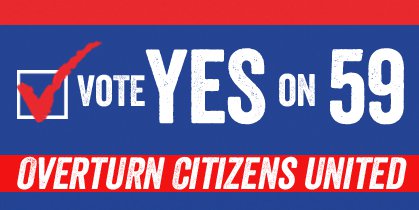
Supporters argue that campaign finance must be regulated. Otherwise, large corporations and billionaires can contribute gobs of money to campaigns frivolously. Supporting an overturn for Citizens United gives support to the little guy and empowers him to make his own decisions.
Endorsements include the California Democratic Party
Overturn Citizens United has raised $10,000.

Opponents say Citizens United is a Supreme Court decision, so state nullification could be a nasty business. What’s more, campaign donations are a free speech right, and are therefore protected under the First Amendment. People ought to be free to do with their money what they please.
There are no official endorsements for the opposition, though Jerry Brown did not sign the legislation that brought Prop 59 to the ballot.
There are no official financial endorsements for the opposition.
Proposition 58. SB 1174 (2014), Lara. English Proficiency. Multilingual Education. Initiative Statute.
Proposition 58 would repeal Proposition 227, which was put in place in 1998, thus reinstating the requirement that publish schools ensure students obtain English language proficiency.
The prop would replace the short “sheltered English immersion” courses with longer courses, tailored for English learners in California schools. More special courses would be available for a longer time period to students learning English.
The proposition states there shall be no visible fiscal impact.
Proposition 227, titled “English in Public Schools” Initiative, altered how “Limited English Proficient” (LEP) students are taught in California. It enacted the following:
- Placed LEP students in classes taught almost completely in English;
- Required students move to English-all courses when they acquired a working knowledge of English;
- Determined that LEP special courses should not last longer than one year; and
- Required the state government to provide $50 million each year from 1998-2008 for English classes to adults that promise to teach LEP students.
Prop 227 effectively eliminated bilingual courses and multi-year courses for “Limited English Proficient” (LEP) students by requiring teachers must teach LEP students in English, and schools could only place them in special courses for less than a year.
Proposition 58 intends to repeal the above and reinstitute a structured immersion program for LEPs. Prop 58 would:
require that public schools ensure students become proficient in English,
require school districts to get community and parent input when developing language programs to ensure effective and quick programs,
allows parents/legal guardians to select an available language acquisition program that best suits their child.
requires school districts provide LEP students the option to be taught in nearly all English,
and allows school districts to establish dual-language immersion programs for native and non-native English speakers,
A “yes” vote would repeal Prop 227, authorizes public schools to create programs for English learners, such as immersion, and a “no” vote would require schools to teach English learners in English-only programs, and maintains Prop 227 “English in Public Schools.”

Supporters argue that by working on and refining the strengths of Prop 227, California’s schools can better serve the diversity of the state and nation. Extensive language immersion programs will better equip students for the future.
Endorsements include Senators Ricardo Lara, Loni Hancock, Bill Monning, and Martin Block; Representatives Nancy Skinner and Lorena Gonzalez. The California Schools Boards Association, Teachers Association, and the Association of California Administrators, along with many California school districts and San Diego State University.
Yes on 58, Californians for English Proficiency Sponsored by Teachers and Service Employees Organizations have raised $125,000.

Opponents argue Prop. 227 already does enough. Creating more larger immersion programs will bring more non-English speakers together, which will result in slower acquisition. The current program provides extensive, effective teaching.
Opponent endorsements include Prop 227 advocate Ron Unz, and U.S. English Chairperson Mauro E. Mujica.
There are no official financial endorsements or PACs for the opposition.
Proposition 53. Revenue Bonds. Statewide Voter Approval. Initiative Constitutional Amendment.
If passed, Proposition 53 would require voter approval before the state could issue more than $2 billion of public infrastructure bonds. State revenue bonds are paid off by fees generated by the project itself and/or increased taxed.
This means projects such as the high-speed rail system and proposed twin-tunnel water project in the Delta would require a statewide vote.
A "yes" vote would require a vote by Californians on any public works state project that is financed with $2 billion or more in revenue bonds, while a "no" vote would continue to allow the state to issue revenue bonds and state debt over $2 billion without voter approval.
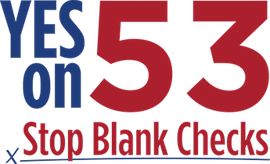
Supporters argue Prop 53 is a smart way to help control California’s out-of-control debt. Just think of Gov. Brown’s high-speed rail (find better words for “wasteful project”): billions over budget, years delayed, mired in red tape, and nothing to show for it. California needs smart budget reform, and Prop 53 is a step in the right direction.
Endorsements include California citizens Dean and Joan Cortopassi, and the Yes on 53: Stop Blank Checks campaign, headed by Tom Ross.
Stop Blank Checks PAC has raised over $4.5 million from state-wide citizen donations; about $4 million have come from the Cortopassis alone.
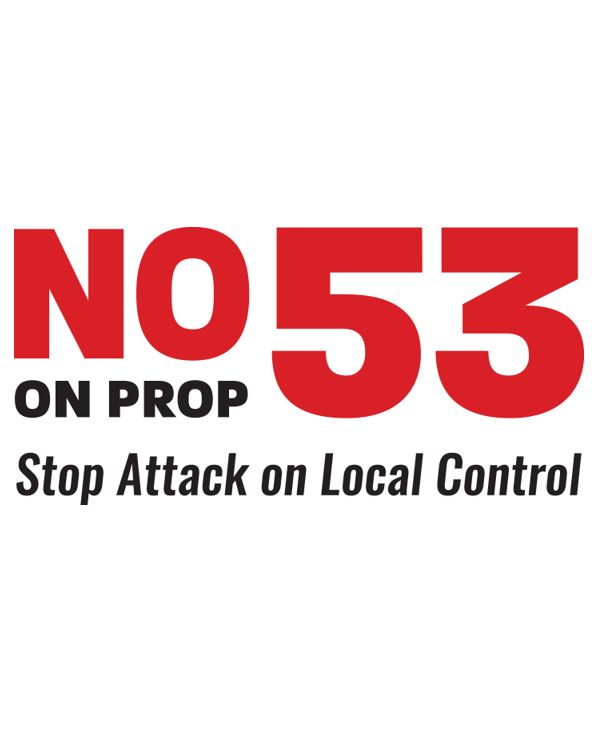
Opponents argue requiring voter approval could impede necessary and urgent infrastructure improvements. Budget hawks could cost the state new roads, and with it, the jobs of thousands of construction workers. Prop 53 is a step backwards, not forwards.
Endorsements include Governor Jerry Brown, California Chamber of Commerce, and State Building and Construction Trades Council.
Citizens to Protect California Infrastructure has raised $850,000, largely from construction workers’ labor unions and affiliated PACs.

